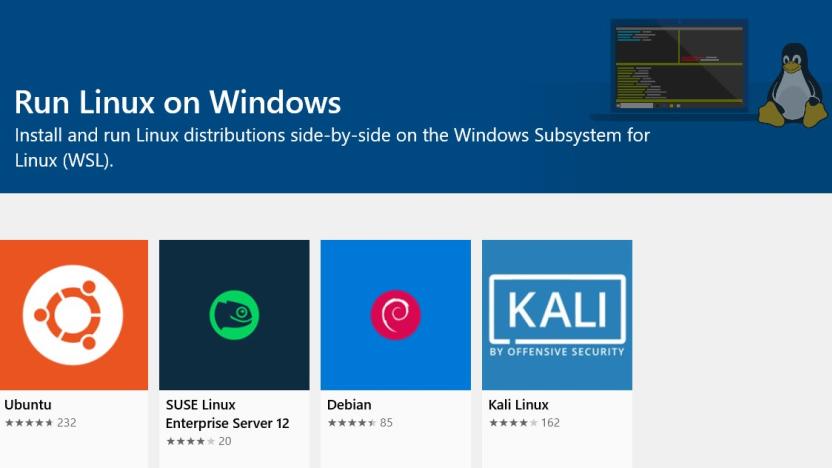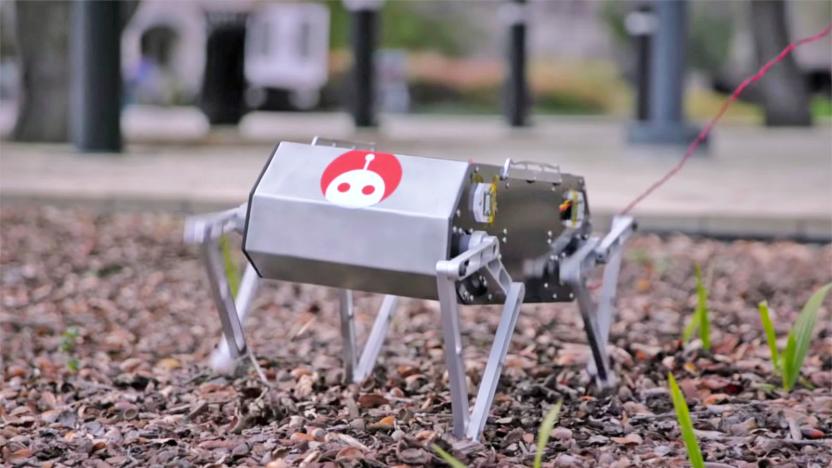open source
Latest

Microsoft's built-in Linux kernel for Windows 10 is ready for testing
Just as promised, Microsoft has delivered a built of Windows 10 to members of its Insiders beta program that includes Windows Subsystem for Linux 2. It was announced just last month at the Build event, and the tech included in Preview Build 18917 (20H1) should bring much faster I/O performance than the previous emulator showed. The company's Command Line blog has more details on how to make it all work, but for real-world benchmarks we'll have to wait for testers to update and interface with it using Linux distributions that are either sideloaded or installed from the Windows Store.

Stanford students' robot dog does backflips for (relatively) cheap
Robots with dog-like talents are nothing new, but it's not exactly practical to buy one that can do more than the basics. The new Aibo is cute, for instance, but not very athletic. A group of Stanford students might have a better solution. They've created Doggo, a four-legged bot that can dance, backflip, jump and trot without requiring exotic hardware. The mechanical canine is made of readily available supplies that achieve the intended acrobatics at minimal cost -- less than $3,000. Instead of using springs to bounce around, it uses force-sensing external motors that continuously determine the levels of force and torque needed for each movement. If the robot's ever out of position, the motors are ready to counteract.

Bioengineers 3D print complex vascular networks
Bioengineers are one step closer to 3D printing organs and tissues. A team led by Rice University and the University of Washington have developed a tool to 3D print complex and "exquisitely entangled" vascular networks. These mimic the body's natural passageways for blood, air, lymph and other fluids, and they will be essential for artificial organs.

This guy built his own smartwatch and so can you
DIY projects can be a lot of fun, and if Raspberry Pi has taught us anything it's that people love to tinker. But for most folk, forays into the world of build-it-yourself tech start and end with a specific kit and a whole bunch of instructions to help them along. Not so for one inquisitive Redditor, who recently revealed that he built an entire smartwatch from scratch. And since he's been kind to enough to share details of the process down to the smallest minutiae, you can too.

Google is sharing a tool to keep your data anonymous from AI
Today, Google released TensorFlow Privacy, an open-source tool that will help keep your data anonymous, even as AI learns from it. The now-public code is based on differential privacy. That's what allows Gmail's Smart Reply to guess what you're going to say by collecting data from other people's emails, and at the same time, keeps Smart Reply from revealing any juicy secrets people have typed before.

Samsung launches first 4G, Tizen-powered smartphone in India
Samsung's experiment with the Tizen operating system hasn't shown up in more than a couple of handsets and some Gear smartwatches so far, but the smartphone behemoth still believes the open-source platform has value for low-cost phones in emerging markets. Case in point: the first 4G Tizen offering, the Samsung Z2 arrives in India next week, with a price tag of around $68 USD (or 4,590 INR) and a range of region-specific features.

Zepp wants rackets and bats to pack integrated sensors
Now that any athlete (or wannabe) can measure their baseball, tennis and golf swings with standalone sensors, Zepp figures that the next step is putting them directly into the sports equipment. The company announced that it's working with several equipment manufacturers to integrate its sensor and cloud tech directly into baseball bats, tennis and badminton rackets, cricket bats, glove gloves and other products. It also wants to partner with companies and sports' governing bodies to develop open-source sensor standards for both professional and amateur athletes.

Have your say on the FCC's plan to lock down WiFi routers
You may know that you can replace your WiFi router's software with an open source version like DD-WRT or Tomato to make it more secure or powerful. However, the US wireless regulator (FCC) only seems to have figured that out recently, and is not happy with your ability to boost the signal power excessively on such devices. As such, it proposed changes to regulations, with one document suggesting it may ban or restrict third-party software altogether. That caught the eye of the Electronic Frontier Foundation (EFF), which created an online petition asking the FCC to make changes.

Razer's VR kit gets Android support and position tracking
Razer recently launched its Open Source VR intiative, complete with a virtual reality headset to get more developers into the VR game. The initial launch notably lacked Android support and positional tracking hardware, but it's now filed those holes with its latest OSVR Hacker Development Kit (HDK) 1.2. The IR system is included in the kit price, including the 100Mhz IR LED system and a camera that provides 360 degrees of position tracking. Previously, Razer included IR position tracking designs and templates, but didn't supply the hardware.

Razer's handing open-source VR kits to more than 20 education labs
Razer's entry into virtual reality may not be as ballsy as HTC's or Samsung's, but it could be just as important. Back in January the gaming manufacturer revealed Open Source Virtual Reality (OSVR), a project that offers a hardware design and software framework that anyone can build VR devices and apps from. Today, OSVR is announcing that more than 20 higher education facilities will join the initiative and be provided with development kits and the necessary support to create new experiences and hardware.

Google open-sourcing the software behind its Fiber TV box
SageTV was one of the original streaming companies, with a DVR box, home theater PC software and even a Sling-like place-shifting app. But since Google acquired it in 2011, all that technology has been off the market and limited to Google Fiber TV boxes. Now, SageTV founder (and current Google employee) Jeffrey Kardatzke says that Google "has agreed to open-source the SageTV platform." We're not sure if that means that SageTV's Google Fiber tech will appear in Android TV devices and what it may mean for developers. All Kardatzke said was that the move "will be happening in the near future" (i.e., months, not years). "I'm looking forward to see what the community can do with SageTV once it is fully open." [Thanks, Brandon!]

Google Code is shutting down because everyone loves GitHub
Goodbye, Google Code. The technology giant has decided to close its project hosting and code collaboration site because, well, there are simply better alternatives on the web. Google says it launched the platform back in 2006 because it was unhappy with the "limited" options available to the open source community. Since then, the likes of GitHub and Bitbucket have risen to prominence, superseding Google Code's feature set and encouraging developers to transfer their projects. As such, Google's offering has become increasingly filled with spam and abuse, leading to the company's decision to pull the plug. Yesterday it stopped accepting new projects, and on August 24th the site will become read-only. Google Code will eventually be shuttered next January, although tarballs of project source, issues and wikis will continue to be available throughout 2016. If you need to transfer a project, head here for the relevant GitHub and Bitbucket migration tools.

Groupon says it's ended its trademark spat with open-source community (update)
Well, this could get messy. The GNOME project is a well-known free and open-source desktop environment for Linux distros. Gnome is also the name of Groupon's new proprietary point-of-sale operating system. The two couldn't be more opposed in ethos, and given the fact that the former has held a registered trademark on its software for the best part of a decade, the GNOME Foundation is understandably upset.

Oculus DK1 source now open to all
The source code used to build the Oculus Rift DK1 is now open and available to everyone interested in tinkering with what is arguably the most famous virtual reality device since Nintendo's Virtual Boy. This means that, regardless of whether or not you have an Oculus Rift (DK1 or not), you can develop your own virtual reality experiences and, potentially, hardware. Oculus CEO Brendan Iribe said at today's Oculus Connect event that releasing the source code for DK1 is the company's way of "giving back" to the community that helped them get where they are today: a massive success story with billions of dollars' worth of investments from companies like Facebook and partnerships with companies like Samsung. "Can't wait to see all the Chinese knock-offs," Iribe joked. [Image: Oculus]

Breach is a completely modular, hackable and open source web browser
When it comes to surfing the web, our options are limited: the market is dominated by three or four mainstream web browsers, all of which share major similarities in design and function. Unless you want to build your own browsing program, you're stuck with their modern browsing paradigms. For San Francisco programmer Stanislas Polu, that wasn't good enough, so, he created Breach -- an open source modular web browser designed to allow anybody to tweak and modify it on a whim.

Original Spelunky gets online co-op mod
Before Spelunky became a household name on XBLA in July 2012, it arrived on PC in late 2008 in its original low-res state. Source code for the original game was made available one year later, and just now received a new mod called Spelunky SD courtesy of Ukrainian developer Vadim. The mod adds, among other things, online cooperative multiplayer to the first version of the game. In what started as a weekend project, the developer spent three months fine-tuning the mod for its first public release late last week. He tweaked the original game in a few ways, adding elements such as "sounds fading off-screen" or making enemies blink when they're about to get up off the ground. Vadim fixed a few bugs as well and made input precision "slightly more forgiving" in the game. The Spelunky SD mod is available to download through GameJolt. [Image: Mossmouth]

Elon Musk 'clears a path' for electric cars by opening Tesla's patents
Following up on his promise from a few days ago, Tesla Motors CEO Elon Musk just announced (in a blog post tiled "All Our Patent Are Belong to You") the company is opening its patented technology for use by others. Saying it will not sue anyone who "good faith, wants to use our technology," Musk claims he's doing this to push electric vehicles as a whole, and points to gasoline cars as the true enemy. The problem he's trying to solve is that while 100 million cars are made every year, Tesla will only ever build a fraction of them and so far, other manufacturers haven't followed its lead with capable EVs. The two big questions now are whether anyone else will step up to the challenge of using the tech behind Tesla's cars and Supercharger network, and can Tesla benefit by open sourcing patented technology for use by others? Clearly Musk thinks so, hoping to inspire a "rapidly evolving" tech platform that brings the world zero emission cars for everyone -- here's hoping other tech giants follow his lead. [Image credit: AP Photo/Paul Sancya]

OpenSSL bug allows hackers to see private communication
The world hasn't yet recovered from the Heartbleed vulnerability in OpenSSL and now there's news of a new bug affecting the popular open-source security package. This recently announced, and already patched, exploit could allow an attacker to see and modify traffic between an OpenSSL client and an OpenSSL server. This sounds worse than it really is. The extent of the issue is extremely limited because we're talking about specific versions of OpenSSL server. Plus, you need to be using that same server software on a client application, and the attack itself is quite a complicated affair.

Contact-Congress simplifies the act of, well, contacting congress
If you've never contacted your congress person then you might not realize how difficult our politicians have made it to get a hold of them. There are 535 members of the House and Senate all whom have some arcane contact form on their websites that obscure their direct email address. It's inconvenient for a single person to write a letter to all their elected representatives. But for organizations looking drive letter writing campaigns it's a nightmare. Individuals won't want to visit three separate sites as part of a push to pass or block a piece of legislation. And while there are services out there that can automate part of the work by routing messages to the right email addresses, they charge thousands of dollars a year for access to their tools and databases.

The Open Source Initiative hopes public awareness is Heartbleed's 'silver lining'
Looking for a positive take to cut though all the negative press that Heartbleed has been getting? Then the Open Source Initiative (OSI) has one. The news has been full of stories about the exploit in OpenSSL (itself, an open-source project) that has caused a wave of panic around the internet. With much of the public not understanding what open-source is (it's complex, but mostly involves freedom to redistribute, and access to the code it's built on), and the fact that all this can be caused by a few lines of edited text, the integrity of open-source software has understandably come under scrutiny. We spoke with a representative from the OSI, and they gave us the positive spin we'd all been looking for.












